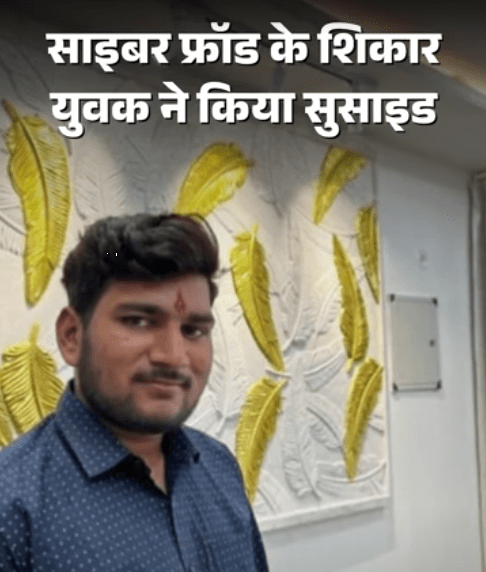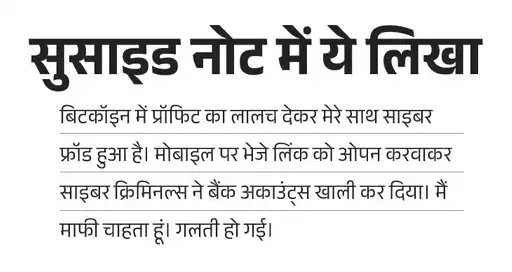In a heartbreaking incident from Jaipur, a 24-year-old young man named Aditya Sharma took his own life after reportedly falling prey to a cryptocurrency scam. This wasn’t just a statistic or a news headline — this was someone’s son, brother, and colleague, who felt so cornered and betrayed that he set himself on fire and jumped from the ninth floor of his apartment building.
The gravity of this case isn’t just about the shocking manner in which it unfolded — it’s about the painful story it tells. One of blind trust, unchecked greed in digital investments, and the dark side of the internet where scammers continue to exploit people’s hopes.
What Actually Happened?
Aditya lived with his parents and younger brother in the Hanging Garden apartments in Bhankrota, Jaipur. He worked at a granite company located in Bagru and, by all accounts, was living a normal life — until things took a drastic turn.

On the evening of the incident, Aditya returned home from work as usual. Later that night, while his brother was out and his father was engaged in religious rituals at home, Aditya quietly siphoned petrol from his bike, went up to the rooftop, doused himself, and set himself on fire before jumping from the ninth floor.

The most chilling part of this tragedy? A suicide note found on his phone. In it, Aditya admitted he had fallen victim to a cyber scam promising quick profits through Bitcoin. He apologized to his family, saying he had made a grave mistake and couldn’t face them anymore. When his phone was checked later, both of his bank accounts had been drained to zero.
Why This Should Deeply Concern Us All
Let’s get one thing straight — cryptocurrency itself isn’t the villain here. But scams built around the hype and mystery of crypto investments are growing like wildfire, especially in India, where digital literacy is still catching up with financial ambition.
Many scammers today use promises of overnight gains in Bitcoin or altcoins to lure people into fake platforms, pump-and-dump schemes, or phishing attacks. These scams are often sophisticated, emotionally manipulative, and designed to prey on the vulnerable — especially young adults chasing financial freedom or wanting to support their families faster.
Aditya’s case is a harsh reminder that anyone can fall for these traps, regardless of education or tech-savviness. All it takes is one convincing message, one fake opportunity dressed as a shortcut to wealth.
What Can We Learn From This?
If it sounds too good to be true, it probably is.
Guaranteed returns in crypto? That’s your first red flag. There are no "safe" profit promises in such a volatile market.Always research before investing.
Verify platforms, cross-check URLs, and never trust unknown individuals offering “tips” or investment opportunities via WhatsApp or Telegram.Talk about losses — not just gains.
In most households, especially in India, we glorify success but hide failure. Had Aditya felt safe opening up about his loss, things could’ve ended differently.Mental health matters.
Financial pressure, shame, and fear of judgment often isolate victims of scams. Families and workplaces must create environments where people feel heard and supported.
A Moment for Reflection
This isn’t just about crypto. It’s about the fragile intersection of hope, risk, and deception in today’s digital world. Aditya didn’t just lose money — he lost all hope. That’s the real tragedy.
As the crypto space grows, education must grow with it. And as a society, we need to stop brushing financial setbacks under the rug and start having open conversations.
Let this story not be forgotten in tomorrow’s news cycle. Share it. Talk about it. Use it as a reason to check in with your loved ones. And if you’re someone silently struggling after a financial loss — please reach out. You're not alone.
Takeaway:
Crypto isn't a lottery. It's a high-risk, high-reward space that demands caution, patience, and solid research. But more than that, we need to build a culture where people can talk about losses without shame — because sometimes, speaking up could save a life.
🟡 If you or someone you know is experiencing distress, please seek help from mental health professionals or helplines. There's always a way forward — even when it feels like there isn’t.

